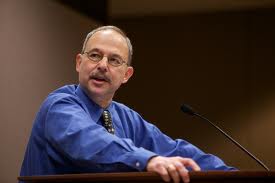From Dr. Lew Margolis.
 On July 1, the Atlantic Coast Conference officially expanded to 15 teams. The day before, the News and Observer informed us that UNC’s football and basketball programs reported dramatic declines in the Academic Progress Rate, one of the admittedly imperfect measures of academic performance that the NCAA touts in order to promote the myth of “student-athlete.” Let’s be clear.There is a troubling relationship between these two recent stories.
On July 1, the Atlantic Coast Conference officially expanded to 15 teams. The day before, the News and Observer informed us that UNC’s football and basketball programs reported dramatic declines in the Academic Progress Rate, one of the admittedly imperfect measures of academic performance that the NCAA touts in order to promote the myth of “student-athlete.” Let’s be clear.There is a troubling relationship between these two recent stories.
We should note the symbolism of staging this ACC announcement at a major stock exchange in New York City. The 15 teams have signed over their media rights to the ACC through 2027, and, with the expanded footprint, each university receives nearly $20 million annually. This is what the expansion is all about, expanding the revenue streams that flow from the media companies that serve the interests of millions upon millions of sports-hungry viewers. What we need to acknowledge, however, is that the expansion is not about enhancing the capacities of these universities to address their missions. The expansion does not help UNC “to serve as a center for research, scholarship, and creativity.”
Indeed, big time sports and the search for media dollars have harmed the mission of UNC going back at least to the late 1990s, as shown by the second story on the decline in academic progress by football and basketball players. What would we do without the stalwart reporters at the News and Observer doing their job in challenging UNC to adhere to the highest academic and administrative standards? Although there is as yet no reliable way to measure whether athletes are getting a meaningful education, wouldn’t it still be better if the indicators we do have demonstrated success instead of failure? We can make an educated guess, however, that the media-driven expansion will not improve any of the educational measures. For example, the media footprint means, of course, that the field hockey team or the baseball team will be traveling 725 miles to South Bend or 650 miles to Syracuse, those towns with deep, historic roots in the life and culture of the Atlantic coast. It’s hard to imagine how the time and energy-sapping experience of this extensive travel will enhance education. Or, does the football team, in order to assure its presence at a game, have to fly out a day early, missing yet more classes and more contact with teachers and fellow students? While impossible to measure its educational effects, we do know that having traded away its media rights, UNC will now subject Chapel Hill and the campus to the disruptions of a Thursday night football game. Will the library close early to accommodate the throngs on campus?

